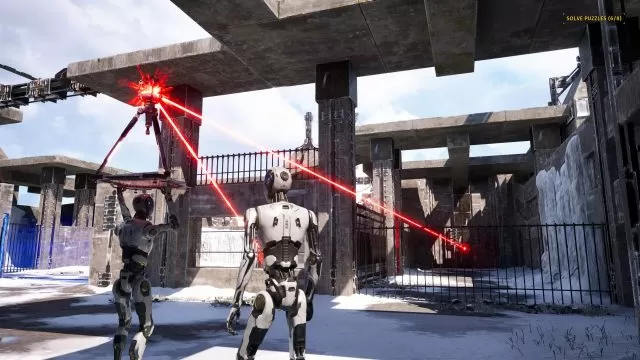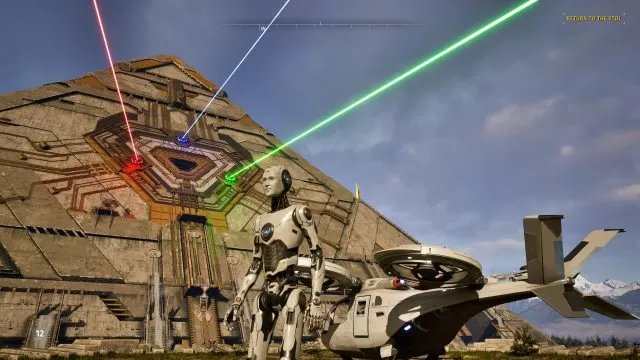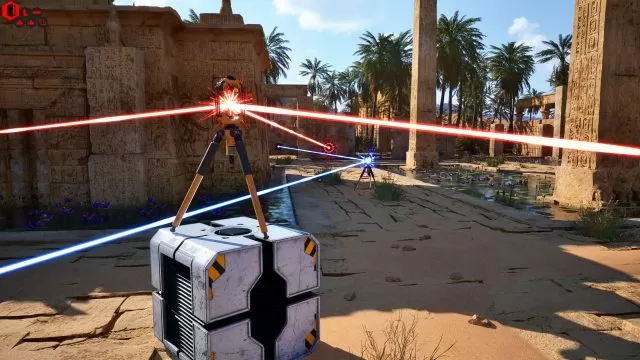The Talos Principle 2 Review – Brain Busting Beauty
There have been several games striving to emulate the simple ingenuity of Portal. Quantum Conundrum, Q.U.B.E, Antichamber, and others were mostly competent from the technical standpoint but lacked personality and ZING. Talos Principle came from nowhere in 2014. and planted its flag firmly into that unconquerable hilltop. Croteam, the devs behind Serious Sam, a fantastic but supremely mindless shooter sensation, managed to sculpt the finest and most intelligent narrative puzzle game in a generation. Lord indeed works in mysterious ways. After Talos, we had The Witness and Superliminal, neither leaving a lasting impression. Drought followed, and the chorus of challenge-hungry player brains went idle for a long time. Until now.
The Talos Principle 2 builds upon the original in several important ways. The sequel is bigger, broader, and more ambitious in every sense, with a much greater variety of puzzles. The underlying philosophical lore is also more profound, dealing with post-apocalyptic hindsight from various perspectives. The game juggles with multiple concepts, but rarely drops the ball, always managing to surprise you. It’s a sophisticated, thinking man’s game. The kind you indulge in with a glass of fine cognac and a Cuban cigar.
Humanity 2.0

Like its predecessor, The Talos Principle 2 is a narrative-based puzzle game. Millennia passed since Elohim’s tests in virtual reality, and the game takes the “best” ending canonical. You know, the one in which a player-led android defied the AI and emerged in a barren, post-apocalyptic world, where humans went extinct due to the lethal virus released by thawing permafrost. If you missed the first game, I strongly suggest at least watching some recap on YouTube. Playing the entire thing would be best if you can find the time.
Anyway, that intrepid android, Athena, successfully kickstarted the new civilization, multiplying its robotic brethren and building New Jerusalem, their shining city on the hill. The android utopia was specifically designed with the goal of not repeating the mistakes of Humanity. Unfortunately, refraining from expanding and taking any risks led to stagnation, and Athena left the city, never to be seen again. Deprived of the founder’s guidance, the young civilization further regressed into apathy and torpor.
(Artificial) life went like this until the creation of the jubilary 1000th android, you. Your emergence from the assembly floor triggered the visual phenomena, a sort of nano-hologram that pointed to the distant island with a strange megastructure. Everyone wanted to believe that Athena tried to send a message, so the ad-hoc council made a snap decision to mount a fact-finding expedition.
It’s huge and it expects your input

In The Talos Principle 2, you are a part of that collective effort to deduce the greatest mystery ever faced by the young robotic civilization. The “collective” part is mostly moot, for it would be you doing most of the legwork, solving the puzzles, and divulging the meaning behind the challenge. The other androids in your expedition serve as a narrative device, helping you to experience and, in a way, shape it. By talking with your fellow adventurers, you’ll pick different answers, synchronizing your views or influencing them to see the world from your perspective.
The enormous island is divided into several zones, accessible via the railcar. Solving the eight puzzles in one area, and repeating the process in two separate sub-zones opens the pyramidal megastructure, enabling the ingress. The mystery deepens with every milestone you reach, and every audio, text, or visual log you trigger along the way. The game is full of excerpts from philosophical literature, expertly combined with that post-apocalyptic hindsight I mentioned earlier. All the signs point to Athena as the visionary behind this project, but what was the guiding principle of this enormous theme park? Is this a real-world version of a VR test Elohim used to have? Maybe it’s conceived as a vessel for a narrative journey that explains why all civilizations are doomed to share the same fate.
Lasers and tribulations

In Talos Principle 2, you’ll spend most of the time solving puzzles. A lot of them. They predominantly involve beams of differently colored lights and wall receptacles, but those are just the foundations of an extremely complex framework. The number of toys and systems at your disposal is staggering. You will experiment with pressure plates, portable cubes, fans, quantum tunnelers, RBG light integrators and splitters, teleporters, and even with consciousness-switching clones. Every new area introduces at least one brand new thing, and pretty soon, you’ll have your plate full of mind-bending options. Talos 2 is humongous. It hovers over other narrative puzzlers like Imperial Star Destroyer over a tiny rebel outpost.
Most of the puzzles are fiendishly good and balanced in a way that offers reasonable escalation. In each new area, the first few are fairly easy, but once the game assumes familiarity, it hits you like Mike Tyson. If you find yourself hopelessly stuck, you can either switch to the new area, provided it’s unlocked, or you can use the flame-token gizmo, that instantly solves it. Those are extremely rare, so I strongly advise you to save some for the mind-splitting finale. If you are seeking additional challenges, each area offers two extra hidden puzzles. Those are optional and almost always harder than regular ones.
Undivided attention

The Talos Principle 2 is going to make you think, and not just in the practical, puzzle-solving sense. The game will suck you into a superbly crafted story, full of melancholy, philosophical discourse, and great characters. It will play with your emotions, putting you in a zen-like environment, roasting your mind over a slow fire, only to poke you with revolving bursts of fatalism and cautious, inquisitive optimism. It can hardly be described, you’ll have to experience it to fully appreciate it.
I wish this intelligent, thought-provoking game came after the holiday rush, so I could give it the undivided attention it most certainly deserves. If you, like me, try to squeeze it between Alan Wake II, RoboCop, and CoD: MW 3, you’ll be doing a great disservice to yourself and the global equilibrium.
Highs
- Expertly designed puzzles will scramble and reorient your mind.
- Excellent, thought-provoking story with multiple endings.
- Superb atmosphere full of palpable melancholy.
- Cost less than 30 bucks/euros.
Lows
- Too much empty space on the island.
- Some puzzles will truly drive you insane.

